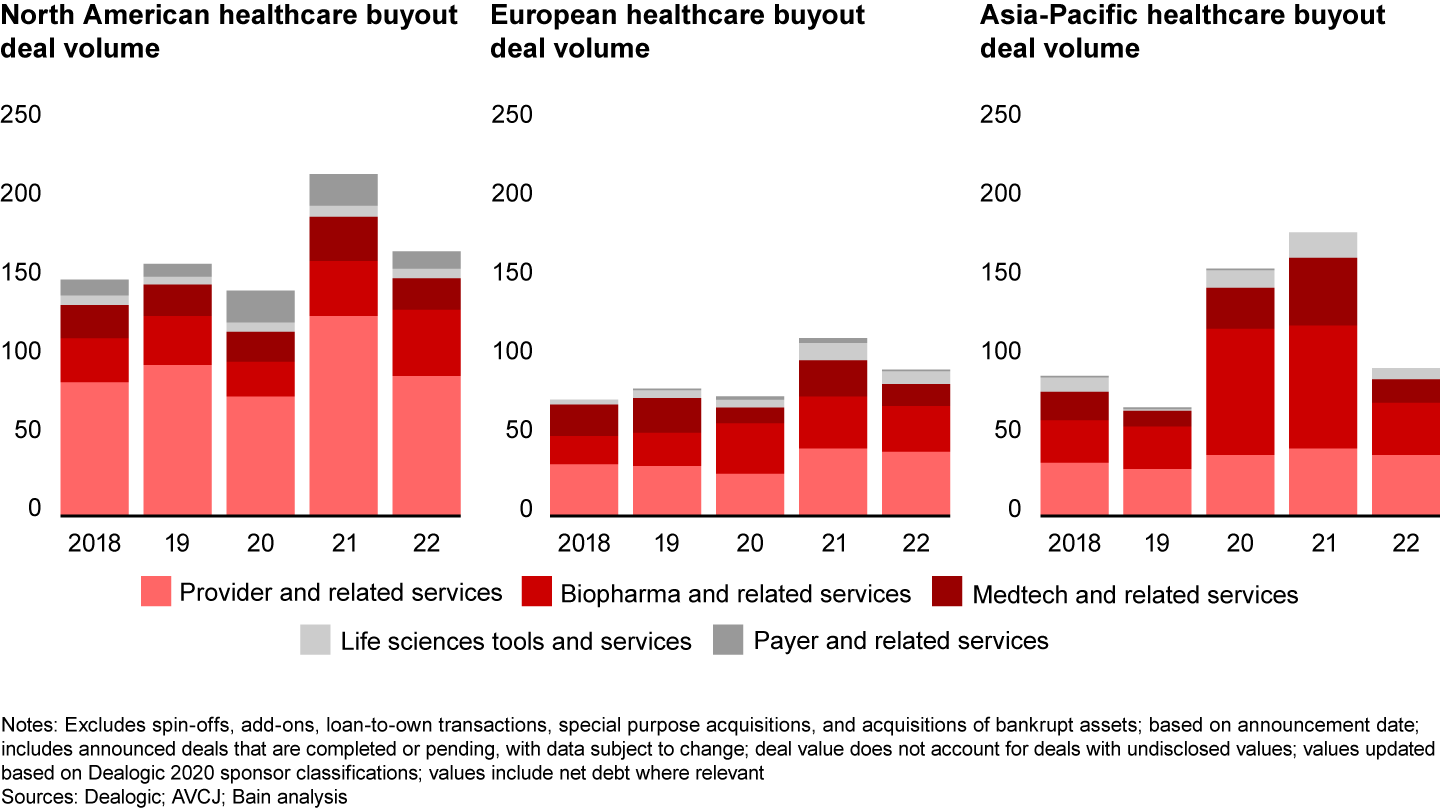Global Healthcare Private Equity Report

At a Glance
- The life sciences tools sector saw 21 deals (compared with 34 in 2021), and disclosed deal value was $8.2 billion (compared with $11.1 billion in 2021).
- Carve-outs of large, mature assets as well as small, innovative growth stories drew investors’ interest.
- Diagnostics and lab services show the progress in the “democratization” of diagnostics and global growth of more complex, genomic tests.
This article is part of Bain's 2023 Global Healthcare Private Equity and M&A Report.
Life sciences tools (LST) and diagnostics deal volume in the first half of the year was consistent with second-half deal activity in 2021, which averaged five to six deals per quarter. And while the second half of the year saw 10 deals, only two of those took place in the final quarter. Deals were split fairly evenly among major regions, with each region seeing between six and eight deals for the year (see Figure 1). However, North America and Asia-Pacific together made up 90% of disclosed deal value. Globally, deal volume in 2022 declined to 21 from 34 in 2021. Disclosed deal value declined to $8.2 billion in 2022 from $11.1 billion the previous year. Deal volume in 2021 in part was driven by Covid-related dynamics, and while 2022 volumes declined from those levels, the long-term trend in transactions continues to be strong.


Clear value levers and path to exit in life sciences tools
Large life sciences tools companies have become widely diversified. Consequently, many companies are looking to simplify their business to shift focus toward areas of growth within their portfolio. This creates an opportunity for private equity to acquire, right-size, and commercially reinvigorate mature businesses. In 2022, this trend played out in two large carve-outs of reagents, instruments, consumables, and services companies. Bain Capital acquired life sciences microscopes maker Evident from Olympus for $3.1 billion, while New Mountain Capital acquired PerkinElmer’s Applied, Food, and Enterprise Services businesses for $2.5 billion.
Investors also looked to smaller, innovative LST assets, focusing on companies with differentiated products, channels, and customer relationships in high-growth areas of research and development (R&D) that could be grown organically through commercial excellence programs, or serve as platforms for product and portfolio expansion via bolt-on acquisitions. There was strong activity in laboratory automation and sample-focused workflows, with a continued emphasis on genomic applications: EQT acquired SPT Labtech, a manufacturer of precision, automated liquid handling devices for sequencing and other genomic testing; Covaris, which sells a variety of instruments, consumables, kits, and reagents for sample preparation in next-generation sequencing and other testing applications, was acquired by New Mountain Capital; and Ampersand Capital Partners made an investment in BioEcho Life Sciences, a European company focused on nucleic acid extraction products. Lastly, Argosy Healthcare Partners completed its recapitalization and merger of automated laboratory tool companies Hudson Robotics and Art Robbins Instruments.
All of these deals reflect the increasing reliance on genomic tools in drug discovery and biomedical research, and are expected to be areas of strong interest for private equity investors.
Diagnostics and lab services highlight global opportunities
There were fewer transactions in 2022 in diagnostics and lab services, as volume declined from 12 in 2021 to 9 in 2022. However, diagnostics and lab services made up around 43% of deals in LST in 2022, up from about 35% the previous year. In diagnostics, as is the case in LST, interest is high in genomic testing and other technologies that may support faster, more accurate health assessments. SJL Partners and SD Biosensor completed a take-private transaction of Meridian Bioscience, a manufacturer of genomic and other specialized testing instruments; the company also sells a portfolio of LST products, giving it multiple vectors for growth.
In lab services, continued progress toward the “democratization” of more advanced diagnostics in less mature economies than the US and Europe was evident. India-based Redcliffe Lifetech, which provides clinical and molecular tests, received growth investments led by LeapFrog Investments, with participation from HealthQuad and others; OrbiMed invested in LifeWell, a new company created through the merger of Indian biotechnology company LifeCell’s diagnostics division and health tech start-up MFine. Elsewhere in Asia-Pacific, Luha Private Equity invested in South Korean company LabGenomics, which sells a variety of genomic and sequencing products, as well as directly supplies next-generation sequencing testing services locally.
The growth in precision medicine and faster or cheaper sequencing technology is likely to continue to power interest in companies both directly and indirectly serving genomic diagnostics.
High bar to win prized assets
Businesses across the life sciences tools sector face different outlooks in 2023. LST should weather the recession well given a diversified end-market and sustained demand for R&D driving the need for instruments, consumables, reagents, and supporting services. But diagnostic companies that sell into hospital labs may face some headwinds in 2023 as hospitals face labor shortages and inflation costs that are likely to challenge profit margins and delay investment in new capital equipment; we expect lab services to continue to recover from the effects of Covid on their testing mix and volume.
We also expect large strategics like Thermo Fisher Scientific and Danaher to be active acquirers in this space. These major companies all have cash on hand: Thermo Fisher, Danaher, Quest Diagnostics, Labcorp, and PerkinElmer have more than $15 billion in combined cash reserves, and all have been active buyers in the past. Competition for assets in high-growth market segments, such as bioproduction, or specifically the manufacture of cell and gene therapies, is likely to continue to be intense.
As highlighted in the chapter “Life Sciences: White-Hot Competition to Win the Right Deals,” the bar for winning the right deals is high. Proactively identifying markets and targets of interest, “prewiring” investment committees to allow for earlier, more aggressive bidding strategies, and leveraging more creative strategies beyond the traditional leveraged buyout model may give funds an edge as they seek to acquire gem assets in these highly competitive markets.